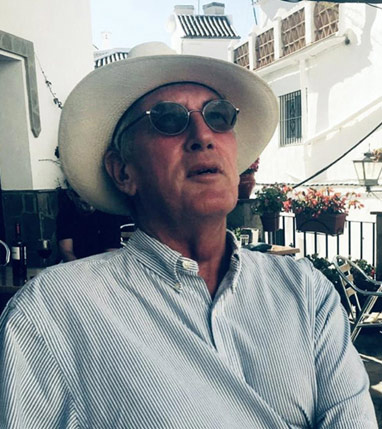Recent Articles
- Jack Charles, Jayne Watson and the Fight for Real Stories
- Francis Lickerish: Q&A
- The Power of a First Line: On Tim Robinson’s Hatham Hall
- Q&A with Jack Charles
- Q&A with Lindsey Mellon
2024-02-07 | Q&A

No, because then, sadly, I’d have to shoot you.
I delved into the explosion of global terrorism in the 1980’s, which conjured up a distant, chilling past. It’s hard to recall the fear that permeated the streets of the capital at the height of the IRA bombing campaigns.
I came across a newspaper cutting about a CIA sting which lured the Soviets into stealing sensitive software, containing flaws, which in due course triggered a monumental explosion in a Siberian pipeline, seen from space and reported by US satellite to be a possible nuclear explosion. I stumbled upon more articles detailing other Western successes ‘helping’ our enemies to obtain forbidden goodies; goodies which didn’t work. And a story started to unfold in my head.
I started my first draft writing a scene in the Libyan desert, a single man on camelback in an empty panorama of dunes. I love deserts, and it felt good writing it, but… it soon finished in the bin (My editor’s pet line being “The wastepaper basket is your friend”). As a lifelong aficionado of the spy genre – Buchan, Conrad, Greene, le Carré, Robert Harris, Cummings et al, I wanted to write a picaresque novel, where the young hero would do the right thing, just, in the end, with mountains of foolishness and high jinks along the way. But, somehow, the protagonist morphed in the writing and ended up as a disillusioned, cynical, middle-aged spy.
I target nine to one, 700 words per day, and usually fail. Sudden creative bursts do occur, when the juices race and the fingers fly. Mainly happens in Spring.
I certainly hope that Dar Fergiani bookshop in Tripoli, bravely remaining open through thick and thin, will stock copies of Straw Man. 13 years after Qaddafi’s death, Libya remains embroiled in a brutal and chaotic civil war. Shortly before his demise, The Christian Science Monitor published an ironic piece entitled “A troubling lesson from Libya: Don’t give up nukes”, which posed the question – Would NATO have bombed him if he hadn’t given up his nuclear programme? Qaddafi ‘s regime went from being, for more than 2 decades, Britain’s implacable enemy, to being our secular ally in the ‘Global war on terror’, famously stamped on our memories by Tony Blair’s photogenic visit to The Leader’s desert tent, wind and robes howling. Then, during the ‘Arab Spring’, things reversed again, and Britain participated in NATO’s bombing campaign which finally did for ‘The Leader’ and his desert tent, after 42 years in power. Last year one of his sons, Saif al-Islam al-Qaddafi, threw his hat in the ring as a candidate for the next Presidential election. Plus ça change?
Santayana got in ahead of Faulkner. He said: “Those who do not remember the past are condemned to repeat it.” Recent wobbles around the Northern Ireland protocol flagged a reminder of how precious is the Good Friday Agreement, how big the prize of peace has been, and how fragile it is. I wove my novel around historical moments, like the Brighton bomb, researching them carefully and seeking to avoid ‘revision’ of history in the telling of my fictional tale.
Drawn from a decade of living in Rome, the memories that readily come to mind are of cloudless skies, dining al fresco on the pavements, the smell of mimosa, the chaotic traffic and the honking of horns. Especially the psychedelic blooming of azaleas in the Piazza di Spagna heralding the coming of the brilliant Roman spring. But intense winter downpours and occasional snowstorms – I remember a huge dump unusually one May – hopefully amplify the qualia of my Rome. I like the sense of daubing paint, using place to add to the ‘smell’ and the mood.
Straw Man is a work of fiction. It should be evident what is history, such as the Brighton bomb, and what is novelist’s prerogative, such as an imaginary Italian Minister describing meeting an imaginary Thatcher and reporting, with dialogue, on conversations which certainly never took place.
I’m close to finishing a first draft of a sequel, ‘The Sheikh’, set in Sudan during the sinister infancy of Al-Qaeda, in the early nineties. Haydon Talbot has been banished to this dusty backwater as Station Chief, seemingly his last hurrah before early retirement. He recruits Charlie Lomax to run a small hotel which serves SIS as a ‘listening post’.